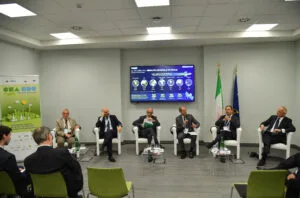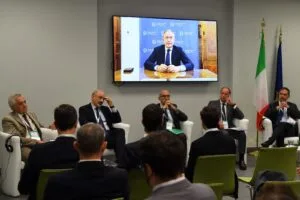Brussels – Before going into orbit, the space economy stops in Rome to outline priorities and directions at the national and European levels. “Space can be at the service of European citizens and policies; we seek to work for Europe to play a key role in space,” says the Head of the Earth Observation Unit of the EU Commission’s Directorate-General for Defense Industry and Space (DG DEFIS), Mauro Facchini, speaking at the Space Economy: Defining the rules to take advantage of opportunities event.

Organized today (May 22) in Rome by Eunews and Gea – Green Economy Agency—both part of the Withub Group—the event focused, in its first panel entitled The Regulatory Framework for the Space Economy, precisely on the importance of cooperation between national and European policies and investments. “What will happen in 2028-2035” with the new Multiannual Financial Framework (MFF) “will be decided today,” Facchini pointed out, anticipating ongoing efforts in Brussels on the legislative level: “To reduce dependencies, we need raw materials, launchers and maintenance of technological capacity,” and with this goal “we are working on a space law to regulate aspects of protection, security, and sustainability—including space debris—of the space domain.”
The need for this perspective was confirmed by Avio’s director of institutional relations, Stefano Stefanile, who recalled how “having the technological and industrial capacity for space access at the national level is fundamental and strategic because it affects a country’s geopolitical positioning” but it is even more so “if we refer it to the European dimension since it allows us to drive the space industry and economy and to be strategically independent of other international players.” Space and economy go hand in hand, as evidenced by the fact that “in 15 years, space activity has tripled its value,” as pointed out by the head for the Coordination Strategic Area New Space Economy of the Italian Space Agency (ASI), Augusto Cramarossa. The growth trend “is evident” and, in the coming years, “will also be driven by private as well as institutional investment,” but much more can be done: “Space is only 0.5 per cent of the global economy, the number is tiny compared to the global economy.”

Minister of Business and Made in Italy, Adolfo Urso, in video conference at the Space Economy: Defining the Rules to Exploit the Opportunities event in Rome (May 22, 2024)
That is why the words of the Minister of Enterprise and Made in Italy, Adolfo Urso, in a video conference at the event organized in Rome, are all the more important. “We are investing heavily in the space economy, by 2026 up to about €7.3 billion, including contributions from ESA, ASI, NRRP and other European funds,” is what the minister of the Meloni government anticipated about the need for access to targeted funding to companies, linking them to the demand for services.” Faced with the “multiplication of non-traditional space activities, innovating is fundamental for future challenges,” but Italy already has a “complete supply chain of exceptional quality, with companies that produce value as innovation, technology, and production.” In his speech, Minister Urso finally stressed that “space is crucial for security and defence, it is a source of technological and scientific progress for companies and the community,” and, in this sense, “the economy is closely connected to space activities.”
It was precisely through EU funds that a considerable boost came for the development of this sector. “NextGenerationEU has allocated a lot of resources to the space sector, and with the National Recovery and Resilience Plan, there has been the largest investment in the Italian space industry,” confirmed Thales Alenia Space Italia CEO Massimo Comparini. While the space market “is undergoing a profound transformation also thanks to the private industrial structures introduced in the United States,” as explained by Joseph Aridon, SVP Strategy and Corporate Development at Telespazio, the growth value of additional services of activities such as institutional satellite observation should not be forgotten: “Growth projections for Earth
observation are 10 per cent each year, and in this context ESA plays an essential role in climate and environment,” explained ESA-ESRIN Director Simonetta Cheli.




